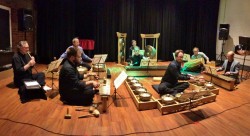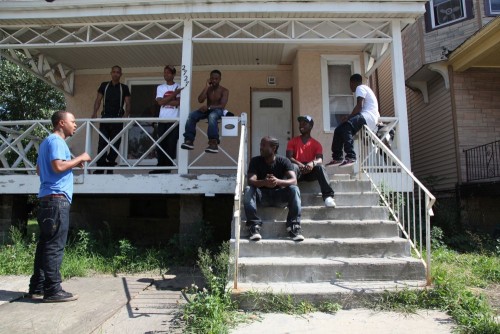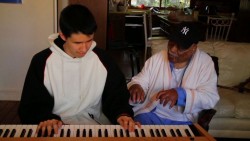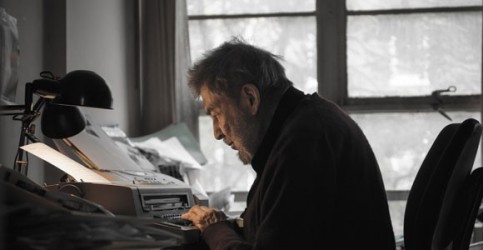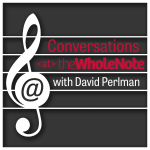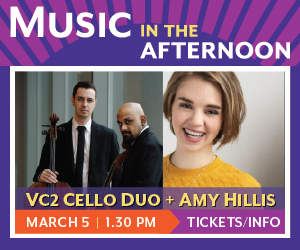In March the Opera Division of the University of Toronto Faculty of Music will be celebrating the 50th anniversary of its move to the Edward Johnson Building. From March 20 to 23 the Opera Division will present Benjamin Britten’s comic opera Albert Herring (1947), which was the first opera to be presented in the building’s MacMillan Theatre back on March 4,1964.
This event provides an excellent occasion to look back on the past 50 years of the Opera Division. Michael Patrick Albano has a fine perspective to offer since he came to Toronto in 1974 to study with Herman Geiger-Torel, who had been the Opera Division’s stage director since 1946 and was still the artistic director of the Canadian Opera Company he had co-founded in 1950. Albano is currently a senior lecturer and the resident stage director at the Opera Division, having directed over 40 operas for it including the Canadian premieres of Debussy’s L’Enfant Prodigue, Paisiello’s Il Barbiere di Siviglia, Britten’s Paul Bunyan and Kulesha’s The Last Duel.
The Edward Johnson Building was built because the Faculty of Music’s old premises could no longer accommodate the expansion of music programs in the 1950s. In a recent interview, Albano explained the importance of the MacMillan Theatre to the opera division: “It is essentially a fully equipped opera house. It has its present design because Geiger-Torel was associated with both the school and the COC. At the time the COC had nowhere to rehearse, so Geiger-Torel urged the construction of such a large stage to give the COC somewhere to rehearse. It is due to the foresight of Geiger-Torel and the other founders of opera in Toronto that the school has such a unique space. Its stage is comparable in size to that of the current Sony Centre with a pit for up to 60 musicians, but it has an intimate auditorium with only 815 seats.” This is ideal for students, as Albano notes, because: “With developing voices it’s great that they’re in a space where they don’t feel that have to over produce. In the current economic climate the MacMillan Theatre simply could not be built today.”
The MacMillan Theatre and the opera programming at the opera division are the two chief areas of study at the Division. Albano has asked former students, as he did recently with John Fanning, what that they found most beneficial at the Opera Division and all of them agree that it is “being able to sing a full-length role in costume in a real theatre with an orchestra in the pit.” He adds: “Just giving them the experience of singing in a real opera house, which is rare in North American opera schools, is something you don’t want forced upon you when you first have a professional job.”
Changes have occurred over the past 50 years. The Opera Division introduced the use of surtitles in its 1999 production of Poulenc’s Dialogues des Carmélites, and, as Albano says, “has never looked back.” Audience members have said they like surtitles even with English-language productions, and this will be the case with Albert Herring. A partial effect of surtitles has been the gradual move away from the double and triple bills that the opera division used to perform to a concentration on full-length works. “The attraction for the students is doing a full-length role from beginning to end,” Albano says. The attraction for the Opera Division is the chance to present works on the edge of standard repertory like Chabrier’s L’Étoile or Britten’s Paul Bunyan that both complement the offerings of the COC and are ideal vehicles for developing voices.
As Albano notes, the Opera Division does its programming from the opposite point of view from a company like the COC. “Unlike a professional opera company where they decide on the repertory and then engage the singers they want, we have to look at the roster of singers in our two-year program and decide what will work best for them.”
Another change, begun in 1987, was the institution of programs for operatic répétiteurs and for student stage directors. For Albano, this reflects the changing times since when he arrived and said he wanted to direct opera, no one knew what to do with him. Now he is encouraged that the Division has so many applications for the stage direction program they can’t accept them all. To him this is just a sign of how excited younger people are in opera as an art form. Maria Lamont, the first graduate of the stage direction program, now has a career working for De Vlaamse Opera and is Robert Carsen’s choice for staging remounts of his work.
In 1997 a student collective formed that was interested in writing operas. Now opera writing has become a course. Unique among other North American opera schools, the students at the Opera Division are able to see their work through from composition to a full staging. The student-written Rob Ford the Opera was such a runaway success in 2012 that it proved there was a hunger among audiences for new opera in Toronto and a hunger for young singers to perform it.
The Opera Division has always offered acting classes for singers but over the years, as Albano notes: “They have become more codified and structured to give modern performers what they need to know. The classes involve both practical instruction such as stage fighting and movement to role interpretation and the awareness of opera as theatre. Gone is the era of ‘park and bark.’ Instruction has evolved with what the public now demands.”
In summarizing what has changed, Albano says: “The huge difference to me in the evolution of the program is an effort at versatility, versatility, versatility.” This means the introduction of works outside the 19th-century core repertoire to include the baroque as well as brand new operas. This means training singers to be more versatile as performers. This means offering the possibility of connecting with opera not just as a performer but as a composer and a stage director. And this means exposing students to as many outside influences as possible through guest directors like Joel Ivany, who will direct Albert Herring, or guest conductors like Les Dala, who will conduct it. As Albano says, “Versatility is important because the more versatile you are the more likely you are to be employed.” All in all, Albano concludes, “I am very optimistic about the future. The art form itself is in a healthy place.”
Albert Herring plays March 20, 21 and 22 at 7:30pm and March 23 at 2:30pm at the MacMillan Theatre. For tickets call 416-408-0208 or visit performance.rcmusic.ca.


